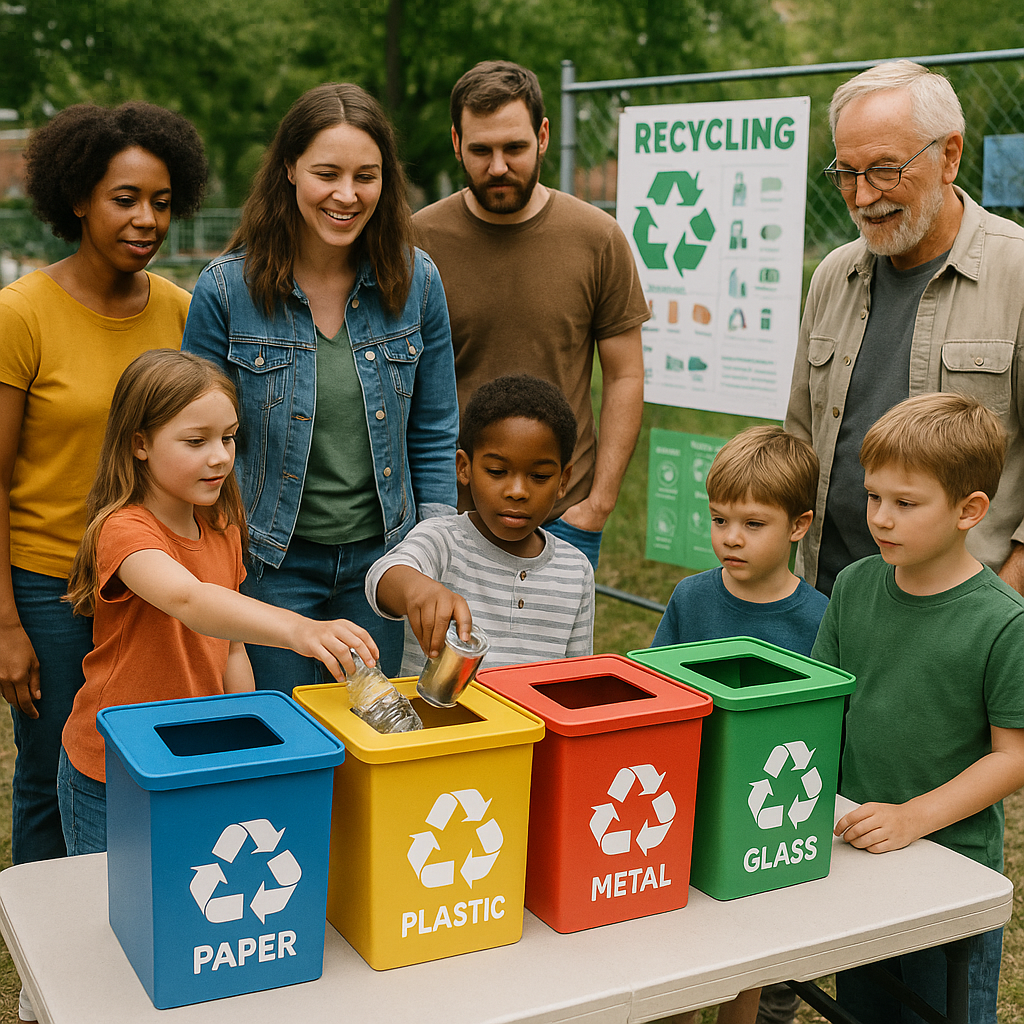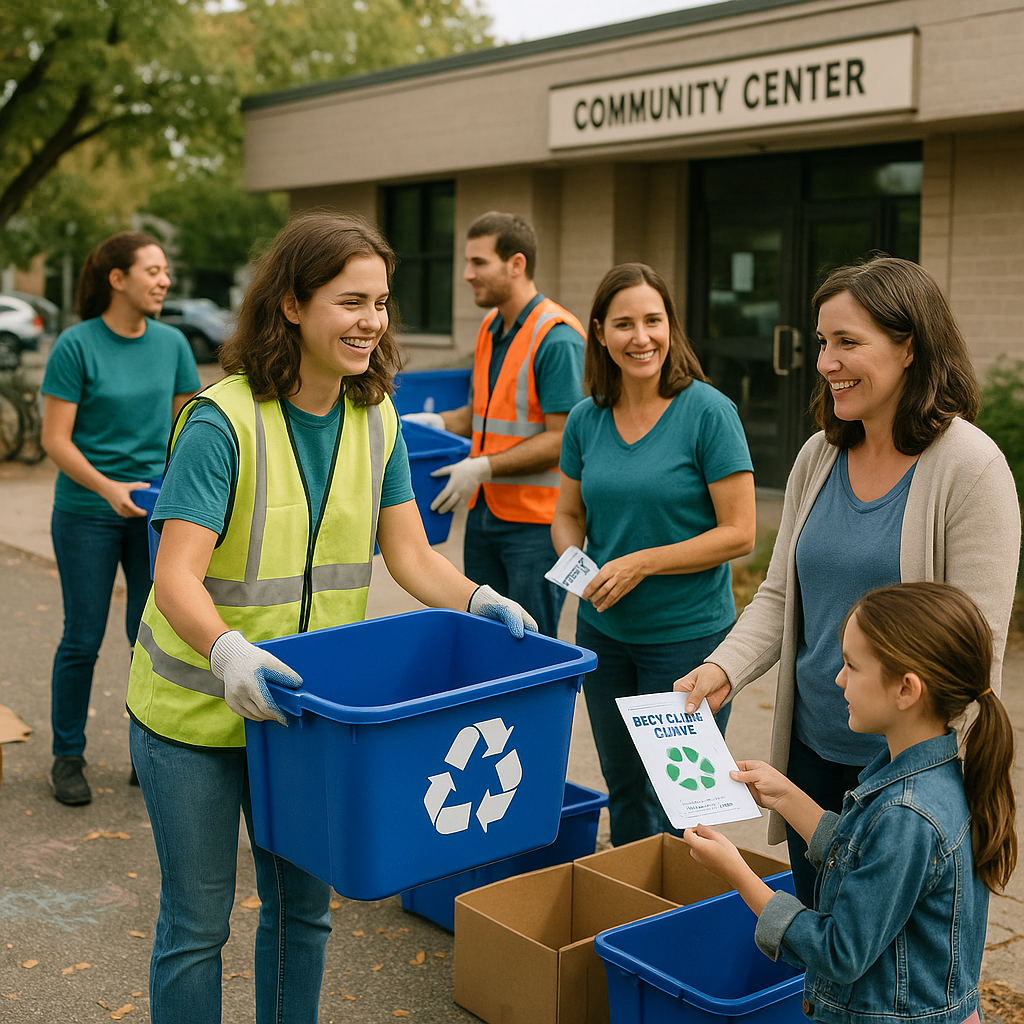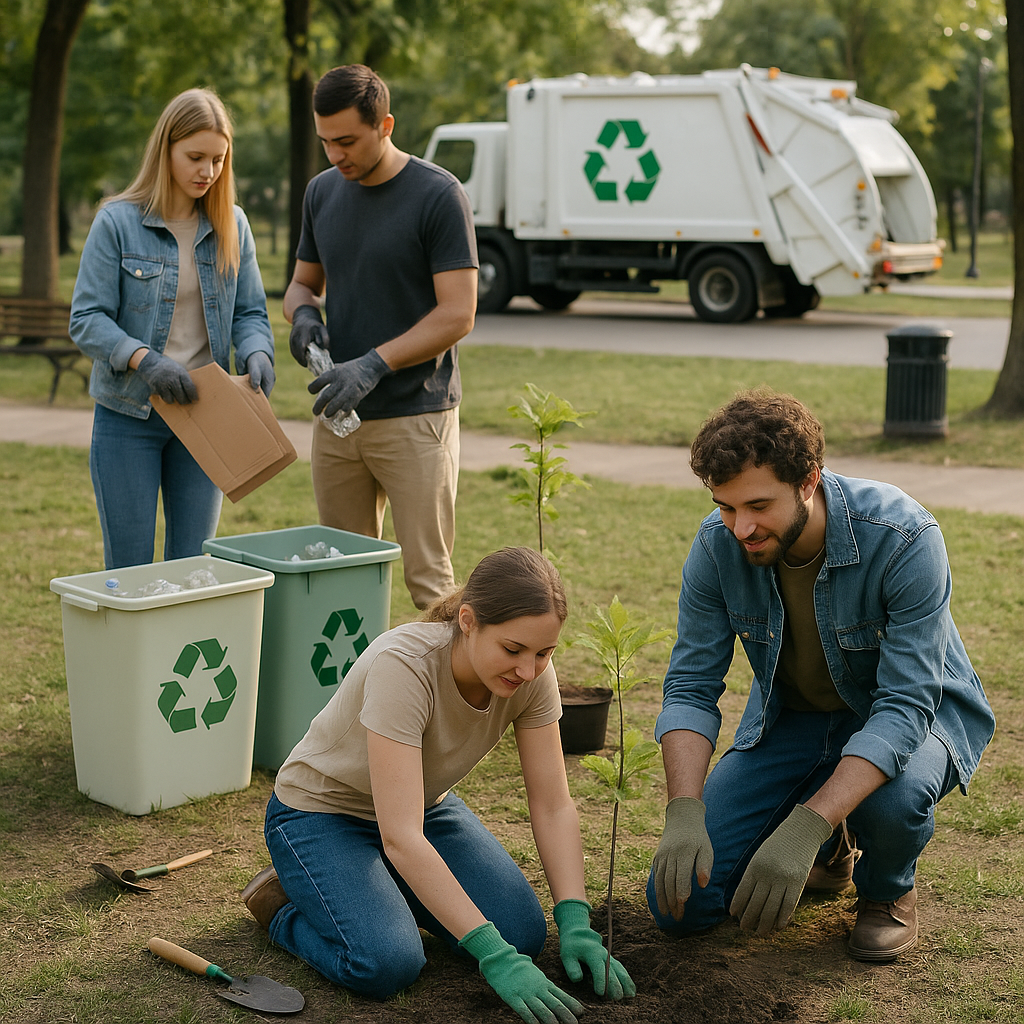5901 Botham Jean Blvd, Dallas, TX 75215
How to Host a Recycling Educational Event
May 9, 2025Educational events focused on recycling act as powerful catalysts for environmental change. These gatherings turn abstract sustainability concepts into tangible community action, creating spaces where residents engage with the practical importance of waste reduction in their daily lives.
Hosting a recycling educational event offers multiple benefits for communities. These events raise awareness of proper recycling practices, strengthen community bonds through shared environmental goals, and provide municipalities and organizations with direct channels to address common recycling misconceptions.
Successful recycling events require thoughtful planning and clear objectives. Whether targeting schools, businesses, or neighborhood groups, these events need engaging content tailored to specific audiences. Strategic organization transforms a simple gathering into an impactful experience that motivates lasting behavioral change toward more sustainable waste management practices.
How Can You Choose the Right Venue and Date for Your Event?

Choosing the right venue and date is crucial for the success of your Global Recycling Day event. Strategic timing and location can significantly impact attendance and the effectiveness of your sustainability message.
Align With Global Recycling Day
Plan your event on or around March 18th to capitalize on the momentum of Global Recycling Day celebrations. This annual observance, established in 2018, offers a natural opportunity to connect your local efforts with global sustainability initiatives.
Scheduling your event on the weekend before or after March 18th can maximize community participation. For instance, The Plaza Coral Gables in Florida hosted their 2025 Global Recycling Day event on Saturday, March 15th, drawing significant community attendance.
Partner With Local Organizations
Collaborating with established community entities provides both credibility and practical support for your event. Consider approaching local schools, community centers, or environmental organizations with suitable facilities.
These partnerships often come with built-in audiences and resources. Many educational institutions are eager to support environmental initiatives that align with their sustainability goals and offer learning opportunities for students.
Prioritize Accessibility Features
Choose venues that are easily accessible to maximize inclusion and attendance. Locations well-connected by public transportation reduce the carbon footprint of your event while making it convenient for more people to participate.
Ensure your venue accommodates attendees with varying mobility needs. Accessible entrances, pathways, and facilities demonstrate your commitment to inclusive environmental advocacy.
Verify Recycling Capabilities
Select a venue with robust recycling infrastructure. This practical consideration reinforces your event’s message and demonstrates environmental responsibility in action.
Verify that the facility offers proper waste sorting stations to model best practices in waste management. This feature turns your venue selection into a teaching opportunity about proper recycling techniques.
Consider Space Requirements
Assess your specific activities when selecting a venue. Will you need outdoor space for clean-up activities? Indoor areas for workshops? Display areas for recycled art exhibitions?
The Great Explorations Children’s Museum in St. Petersburg, Florida, successfully hosted a recycling workshop for their 2025 Global Recycling Day celebration because their venue offered appropriate spaces for hands-on learning activities for families and children.
What Interactive Elements Can You Include in Your Recycling Event?

Engagement is key to a successful recycling event. Adding well-designed interactive elements transforms passive attendees into active participants. These hands-on components create memorable experiences that reinforce sustainable behaviors long after your event concludes.
Workshops and Training Sessions
Educational workshops serve as the backbone of effective recycling events. Two-day design training sessions can explore recyclability concepts, packaging lifecycle, and design recommendations. Morning classroom sessions paired with afternoon hands-on activities provide comprehensive learning.
DIY recycling workshops empower participants with practical skills for home use. Sessions focused on upcycling everyday items into useful products demonstrate the creative potential of materials often discarded. Specialized training for businesses on designing recyclable packaging addresses professional needs.
Demonstrations and Tours
Live sorting demonstrations reveal the journey materials take through recycling facilities. Attendees gain firsthand knowledge of proper waste separation techniques. These visual experiences clarify misconceptions about what can and cannot be recycled.
Consider organizing recycling facility tours where available. The Association of Plastic Recyclers offers tour programs showcasing the North American recycling system. Seeing the process transforms abstract concepts into tangible realities for participants.
Composting technique demonstrations complete the waste management picture. Show attendees how organic waste becomes valuable soil amendment. Simple setups with different composting methods offer participants options that fit their living situations.
Interactive Learning Stations
Create hands-on learning stations where participants actively engage with recycling concepts. Waste sorting challenges test knowledge while reinforcing proper disposal habits. Time-based competitions add excitement while building practical skills.
Environmental investigation stations encourage scientific exploration of recycling, pollution, and conservation concepts. These work especially well for younger participants. Simple experiments demonstrating environmental impacts make abstract concepts concrete.
Resource conservation games illustrate the importance of reducing consumption before recycling. Activities highlighting the energy saved through recycling versus manufacturing from raw materials provide powerful context. Interactive calculators showing environmental benefits of different actions give tangible metrics.
Community Collaboration Opportunities
Partner with local environmental organizations to broaden your event’s expertise and reach. These collaborations bring diverse perspectives and specialized knowledge. Local experts add credibility and community connection to your programming.
Create spaces for community members to share their sustainability successes. Peer learning fosters community spirit and practical knowledge exchange. These testimonials inspire action more effectively than abstract information alone.
Involve local schools in presenting student projects related to recycling and sustainability. This approach builds intergenerational connections around environmental stewardship. Student participation ensures fresh perspectives and energetic engagement.
Digital Engagement Strategies
Develop social media campaigns that extend your event’s impact beyond physical attendance. Interactive hashtag challenges encourage wider participation. Photo contests featuring creative recycling solutions spread sustainable ideas organically.
Create QR codes linking to additional resources throughout your event space. These digital gateways provide expanded information without overwhelming printed materials. Links to webinars and online communities sustain engagement after your event concludes.
Live-stream key presentations and demonstrations to reach those unable to attend in person. This digital inclusion broadens your impact significantly. Recording these sessions creates lasting resources for future reference and sharing.
How Can You Ensure Lasting Impact After the Event?

To create a lasting impact after a sustainability-focused event, strategic follow-up and ongoing engagement are essential. Post-event communication reinforces key messages and encourages continued action. Share comprehensive event highlights through email newsletters, social media, and your organization’s website to maintain momentum.
Success stories make your recycling efforts tangible and inspiring. Share specific achievements from your event, such as waste diverted from landfills, materials recovered for recycling, or carbon emissions reduced. These quantifiable results help stakeholders understand their impact and the value of their participation.
Communicate Results and Impact
Sharing post-event results provides clear evidence of your sustainability efforts. Collect data on waste reduction, materials recycled, and overall environmental impact. Present these findings in easy-to-understand formats that highlight the positive difference made through collective action.
Gathering feedback from participants, staff, and partners offers valuable insights for improving future initiatives. Use surveys to understand what resonated with attendees and identify areas for improvement. This information helps refine your approach and demonstrates your commitment to continuous enhancement.
Foster Ongoing Engagement
Implementing a continuous improvement plan helps maintain eco-responsible practices long after the event concludes. Develop an action plan that builds on successful strategies and addresses challenges encountered during the event. This approach ensures sustainability remains a priority in all future activities.
Provide practical resources that help attendees incorporate recycling and sustainability practices into their daily routines. This might include guides on proper waste sorting, information about local recycling facilities, or tips for reducing waste at home and in the workplace. Making sustainable choices accessible increases the likelihood of long-term adoption.
Turn Lessons into Long-Term Habits
Educational initiatives play a crucial role in transforming event experiences into lasting behavioral change. Organize follow-up workshops, webinars, or online resources that delve deeper into recycling processes and sustainable practices. These educational opportunities reinforce key concepts and provide practical knowledge participants can apply in various contexts.
Establishing ongoing communication channels keeps sustainability at the forefront of participants’ minds. Regular updates about environmental initiatives, recycling successes, and upcoming opportunities for engagement maintain connection and commitment to sustainable practices. This consistent presence helps transform one-time actions into habitual behaviors.
Building a community around shared environmental values strengthens commitment to sustainable practices. Create platforms where participants can share their sustainability journeys, ask questions, and support each other. This sense of community increases motivation and provides ongoing inspiration for environmental responsibility.
Conclusion: Inspiring Community Action Through Recycling Education

Hosting a recycling educational event effectively promotes sustainability, reduces waste, and supports a circular economy. By planning your objectives, selecting the right venue, incorporating interactive elements, and ensuring a lasting impact, you can inspire your community to embrace a greener future. These events act as catalysts for change, bringing together residents to learn about proper recycling practices and how their actions contribute to environmental conservation.
Ready to make a difference in your community? Contact Okon Recycling at 214-717-4083 for professional guidance on organizing effective recycling education events, accessing recycling resources, or implementing comprehensive waste management solutions for your community projects.
